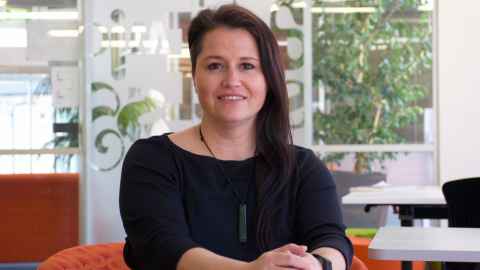Empathy and connection: the foundations for teaching excellence
23 October 2020
Sustained Excellence in Teaching Award recipient, Dr Kelsey Deane, discusses her career as a youth worker, her current life as an academic, and the relationship-first approach she brings to teaching.

Each year, the University of Auckland grants up to six awards, across five categories, to University lecturers who have shown to be excellent examples of teaching excellence. From these winners, three awardees are usually selected to become the University's nominees for the national Tertiary Teaching Excellence Awards.
This year, Dr Kelsey Deane of the Faculty of Education and Social Work (School of Counselling, Human Services and Social Work) was awarded one of three Sustained Excellence in Teaching Awards.
While, on paper, Dr Deane works as a senior lecturer within the Bachelor of Social Work and Master of Social and Community Leadership programmes, she has spent years dedicating her life to the field of youth work and building relationships with communities.
Her first formal job was working as a lifeguard at a local pool in her hometown of Fredericton in New Brunswick, Canada and the connections she made with the young people there were pivotal in influencing her decision to pursue a career in the youth work field.
"A group of First Nations young people spent most of their summer days at that local pool and our staff developed close relationships with them. They were incredibly bright and witty and taught us some crazy diving moves. Connecting with them was the reason I wanted to go to work each day.
A group of First Nations young people spent most of their summer days at
that local pool and our staff developed close relationships with them.
They were incredibly bright and witty and taught us some crazy diving
moves. Connecting with them was the reason I wanted to go to work each
day.
"I also witnessed many adult patrons of the pool treat them with racist hostility that understandably provoked aggressive reactions and fuelled negative stereotypes about them. I never saw that kind of behaviour when they were treated with respect.
"My relationships with those young people left a mark on me. Eight years later, I spent a short stint living in Inuvik, Canada, in the Arctic and I had similar experiences with the indigenous young people living in that community. I was a youth worker at the local youth centre and then became the coordinator for the centre. That ignited my interest in pursuing a career focused on youth work," says Dr Deane.
In 2006, Dr Deane made the switch from working in a practical youth work setting, into academia, when she moved to New Zealand and enrolled in a PhD at the University of Auckland to develop a deeper understanding of how to best support young people. As she came to the end of her thesis, an academic position related to her PhD serendipitously came up at the Faculty of Education and Social Work.
"I had been exploring non-academic positions, but the right academic job came up at the right time. The faculty was advertising for a lecturer in Youth Work a few months before I was due to submit my thesis. It was a very good fit for my research and teaching interests, so I felt very fortunate to be offered the position."
Empathy is so important when it comes to meeting learner needs and it's
hard to be empathetic when you don't have a good connection with your
students. I love witnessing moments when a student's effort has really
paid off and they achieve more than they imagined they could.
Dr Deane has remained a lecturer and researcher within the faculty ever since, working on influential programmes and research such as the therapeutic youth mentoring programme, Campus Connections Aotearoa.
On the topic of teaching students, Dr Deane believes in a "relationship-first approach".
"I think teaching excellence is based on the integration of many different factors. That said, I believe that a relationships-first approach creates a strong foundation.
"Empathy is so important when it comes to meeting learner needs and it's hard to be empathetic when you don't have a good connection with your students.
"I love witnessing moments when a student's effort has really paid off and they achieve more than they imagined they could. You genuinely see that sense of accomplishment really build them up and it's a privilege to share that experience with them.
"I also love the potential that teaching has to create ripple effects by equipping students to pass on their knowledge and skills to others."